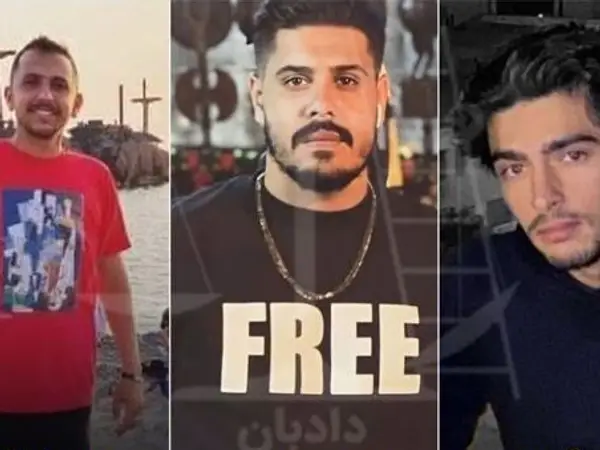Dadban, a group of pro-bono lawyers in Iran defending political prisoners and rights activists, has warned about the potential execution of three young men in Tehran.
In a report Friday, Dadban said the three young men – Milad Armoun, Mehdi Hosseini and Alireza Kafaei -- have been charged with Muhariba (pronounced moharebeh in Persian) for the killing of a 21-year-old Basiji militia member named Arman Aliverdi in Tehran’s Ekbatan neighborhood October 26 amid nationwide protests.
Muhariba is an Islamic-Arabic term that in the lexicon of the Iranian regime means bearing arms and “fighting God” or “waging war against God,” and carries the death penalty.
A video circulating on social media at the time showed Aliverdi bleeding from the face and head while a protester kicked him. He later died in hospital. Authorities claim protesters also stabbed him.
Defendants in the case have denied stabbing Aliverdi who the residents of Ekbatan say had been trying to infiltrate the protesters to identify their leaders.
A young woman, who identifies herself as Aidi and runs the neighborhood’s popular Twitter account, told Iran International that the case is still under investigation and the accused have not been sentenced yet.
According to Payam Dorfeshan who represents one of the defendants in the case, the accused were tortured to confess to Aliverdi’s killing and implicate each other, Dadban said.
It also reported three other defendants, Mehdi Hosseini, Hossein Nemati and another yet unnamed young man apparently arrested in Ahvaz recently, have been charged with “complicity in murder” and “propaganda against the regime”.
After the incident, security forces from various agencies carried out many raids in Ekbatan and arrested at least fifty young protesters. Fourteen of the detainees were eventually indicted but others were freed later for lack of any evidence of their involvement in Aliverdi’s killing.
Dadban quoted Dorfeshan as saying that security forces’ violent daytime and night raids in Ekbatan were meant to arrest defendants and other protesters and instill fear among the residents.
The west Tehran neighborhood was an epicenter of protests ignited by the death of Mahsa Amini, the 22-year-old woman who was fatally injured in September 2022 while in police custody following her arrest for not wearing “proper” hijab.
“These raids have seriously affected the mental health of the residents, particularly children.There are reliable reports about sleep disturbance and nightmares among children after these raids. Their drawings also show violent scenes as a result of [witnessing] the raids,” he said.
During the heat of the protests, Basij militiamen and officers of various intelligence and security forces in plainclothes attacked chanting young people who marched in small groups around the blocks of apartments in Ekbatan.
Basijis and other security forces on several occasions shot at people’s windows indiscriminately, rampaged the entrance lobbies in several blocks, broke the windows, and destroyed the lobby furniture and intercoms to give the residents a lesson.
The ever-present Basij have four bases within the five square kilometer complex which has 15,500 apartments and a population of around 45,000.
Regime forces often used tear gas, shot pellets at protesters for chanting “Death to Khamenei” and “Down with the Dictator” every night, and made arrests both outside and inside the buildings.
